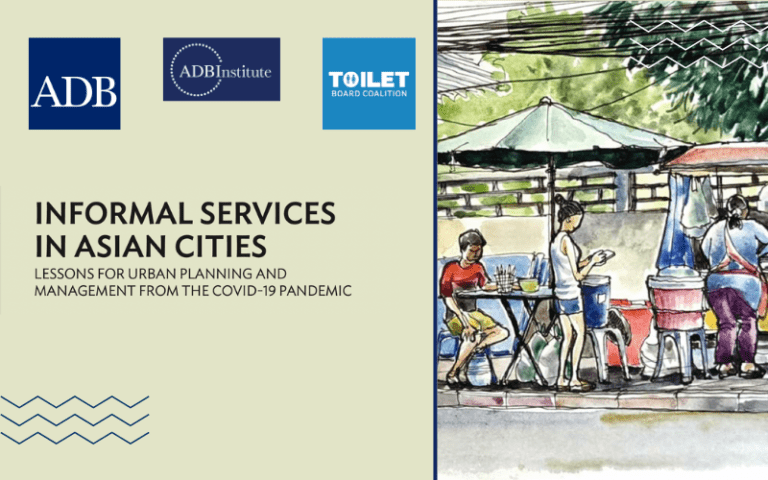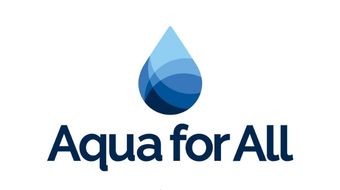We are deeply saddened by the news that Prakash Amatya, CEO of Aerosan Sustainable Sanitation Nepal has passed away unexpectedly on 17 September 2022. He played a vital role in Water and Sanitation and was a shining light for all who were privileged to interact with him. Our condolences go to his family, friends and colleagues.
How the Sanitation Service Providers Thrived During the COVID19 Pandemic

This complements the ADB Study entitled “Informal Services in Asian Cities: Lessons for Urban Planning and Management from the Covid-19 Pandemic”. The full study may be accessed here.
“Diverse and decentralized social enterprises and small and medium-sized enterprises (SME) bring innovation, agility, and resilience to the water and sanitation sector. The book provides evidence of the crucial role social enterprises and SMEs play in bridging formal services and customers in Asia’s informal settlements. The book also highlights how using intermediaries offers many benefits that frequently extend beyond just technical gains to include social and gender equity gains.” – Christian Walder, Water Supply and Sanitation Specialist at Asian Development Bank
COVID-19 surfaced global challenges as supply chains, travel, and business, in some cases, was brought to a standstill. The role of safe and hygienic sanitation to curb the spread of the virus is apparent. Yet, around one-third of the world’s urban population lives in informal settlements, where many depend on informal service providers for sanitation access. As informal service providers are unregulated, the safety and hygiene standards cannot be managed. This heightened policy makers’ understanding of the great extent that the informal sector has in influencing society’s health and economy.
The Asian Development Bank (ADB) and the Asian Development Bank Institute (ADBI) commissioned a study to understand the impact of the pandemic on informal services in Asian Cities. The Toilet Board Coalition particularly looked at the sanitation service delivery in informal settlements and how certain businesses fared, bringing insights to build more resilient systems for the future. We worked with sanitation service providers throughout the latter half of 2021 to understand the implications, innovation and lessons learned throughout the pandemic.
Anjanette Bansao, Research Associate at the Toilet Board Coalition interviewed Accelerator alumni including Aerosan, Eram Scientific, Bhumijo, Suvidha and Laguna Water and shared insights with ADB and ADBI. “Having just joined the team at the Toilet Board Coalition, I was thrilled to be involved in this publication. Hopping on calls with businesses and learning from them was such an enriching experience. I knew COVID19 brought innumerous challenges, but I didn’t know the extent of its impact, especially on sanitation and informal settlements. This research brought that to light. It also showcases the innovations that sprung during the pandemic – proving the sanitation businesses’ creativity and capacity to innovate.”
In our research we found that:
Sanitation businesses are resilient and have the capacity to innovate and thrive under incredible pressure.
Sanitation businesses demonstrate incredible ingenuity in their management of the challenges thrown at them during the pandemic. Sanitation business leaders are a special breed of leader – creative, adaptable and driven by impact and innovation. They focused on keeping their businesses operational and retaining their teams – channeling time and energy into innovation and relationship building which has accelerated their recovery and growth.
For instance, in Bangladesh, Bhumijo installed devices to collect feedback to monitor and clean accordingly. Moreover, as investment in hygiene accelerated during the pandemic, businesses were provided the opportunity to further their innovation. Subsequently, Aerosan installed several services such as footfall counting devices, diaper changing stations, and sensor-based urinals. Bhumijo launched a new pedal-operated flushing system and pedal-operated handwashing stations for customers to avoid direct contact and limit the spreading of COVID-19. Businesses also introduced and accelerated digital payment platforms to facilitate easy payments.
Sanitation businesses are naturally agile – quickly diversifying their model and their products to keep their businesses alive and growing.
The pandemic prompted some sanitation businesses to diversify their revenue model – adding revenue streams for product sales and research work that was not scoped pre-pandemic. Those with diversified business models – operating toilets in multiple settings (communities, public, schools, etc.) and/or operating sanitation services in complement to other community services – thrived well during the pandemic. Businesses that operated both public and community toilets were more readily able to adapt their service offering and their team allocation and hence were more resilient. Those that coupled their sanitation offering with other community services – laundry, café, small shops, rebounded even quicker.
Sanitation businesses become more shock resilient through strong and established relationships with the government and community.
Strong networks of support and community around the businesses are important. Collaboration and constant coordination and communication with the local government bodies as well as support and authorisations helped in the continued delivery of services to the public, particularly in informal settlements.
Sanitation businesses are powerful entry points to communities.
Sanitation businesses understand the needs of their customers, their daily realities and this relationship can prove an opportune platform upon which other services and information can be built. Key liaisons within the community served and a pre-established brand built on hygiene and quality service proved key in the resiliency of the sanitation businesses. Engaging community leaders is of even greater importance as they become important channels for trust and communication with the community and customers.
Sanitation businesses call for the elevation of sanitation-related profession.
Sanitation businesses face challenges when recruiting to grow their workforce. Working in the sanitation sector, especially in the maintenance of public and community toilets, is deemed to be the “last resort” profession. Although the pandemic has raised the profile of sanitation and hygiene, it has not yet raised the profile of those cleaning and maintaining the toilets. Thus, elevation of their profession should be a priority. Aerosan (Prakash Amatya) is a leader and champion of this, referring to their team as ‘hygiene hostesses’ akin to flight attendants. Better professional development, wages, benefits, resources, and technology are an excellent beginning. The elevation of this work and recognition of its vital role in public health and as a community hub will further build the sector’s resilience.
The research showed that with the right support and partnerships, sanitation businesses (SMEs and social enterprises) could be effective and complementary service providers of water and sanitation. They bring innovations and transformative interventions to the sector and bridge formal services and customers in Asia’s informal settlements. This proves their ability to deliver sustainable services quickly and behave innovatively when confronted with external challenges such as the COVID-19 pandemic.






